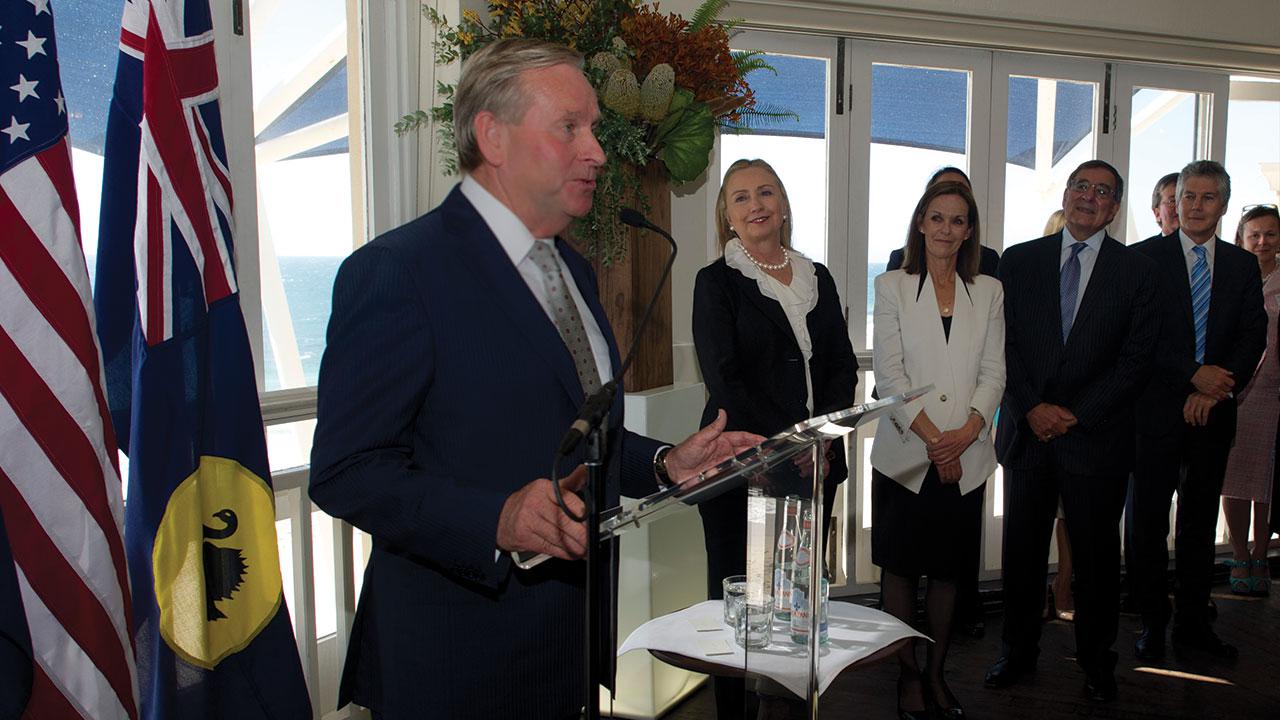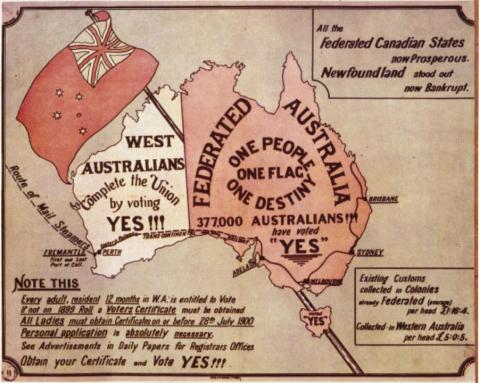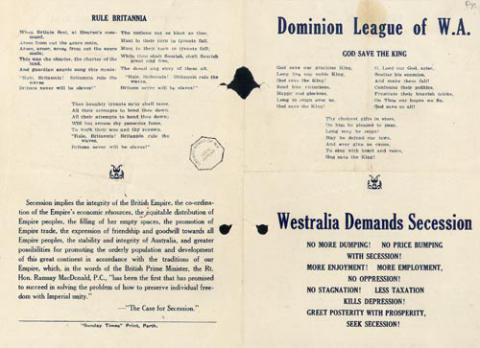
Murmurings about Western Australian secession occurs from time to time. And especially occurs when there are perceptions in WA that they may be getting ‘ripped off’ by the Federal government.
With Western Australia’s GST payments dropping below 30 cents for every dollar being collecting in the State, the Premier of WA stated:
“I think the commonwealth government grossly underestimates the tension that’s going to arise in the federation,” he said. “It’s not secession, but it will be tension and disengagement.”
Although this time around secession itself is not being sought, the Western Australia Government is threatening to harm the federation by disengaging with the federal government.
We thought it was a good time to take a look at whether Western Australia could secede and consider what tension and disengagement means?
The Constitution and the indissoluble Federal Commonwealth
Our Constitution is contained within a British Act, the Commonwealth of Australia Constitution Act 1900.
The preamble to the British Act to constitute the Commonwealth of Australia states:
WHEREAS the people of New South Wales, Victoria, South Australia, Queensland, and Tasmania, humbly relying on the blessing of Almighty God, have agreed to unite in one indissoluble Federal Commonwealth under the Crown of the United Kingdom of Great Britain and Ireland, and under the Constitution hereby established:
On 9 July 1900 the five colonies that now make up Eastern Australia united in an indissoluble Federal Commonwealth by this Act of British Parliament.
Western Australia and Federation
 You may notice that Western Australia is not named in the preamble to the British Act. The reason being that it wasn’t until after the Commonwealth of Australia Constitution Act was passed by the British Parliament that the Western Australia colonial parliament realised the other colonies were going to federate without it.
You may notice that Western Australia is not named in the preamble to the British Act. The reason being that it wasn’t until after the Commonwealth of Australia Constitution Act was passed by the British Parliament that the Western Australia colonial parliament realised the other colonies were going to federate without it.
There had been a reluctance to join the federation within Western Australia, however three weeks after the British Act was passed the WA parliament reversed its opposition to federation and held a referendum. By this time public opinion in Western Australia had shifted and an overwhelming majority of voters agreed to join the indissoluble Federal Commonwealth with a 3:1 yes vote.
The Western Australian secession referendum in 1933
It appears that after federation Western Australians held some reservations about being part of the Commonwealth of Australia. Due to economic factors including the great depression, sentiment for Western Australian secession grew throughout the 1920’s and 30’s.

A referendum for secession was held in WA in 1933. The question was:
Are you in favour of the State of Western Australia withdrawing from the Federal Commonwealth established under the Commonwealth of Australia Constitution Act (Imperial)?
The result was a resounding 3:1 Yes vote.
The new Western Australian Premier that had been elected at the simultaneous election (and had campaigned for the no vote) pursued the will of the people expressed at the referendum by sending a delegation to London. The Western Australian delegation was seeking to persuade the British Parliament to overturn the Act of Parliament which had formed the Commonwealth of Australia. It was inevitably rejected.
The British Government stated that it did not have the power to grant WA secession without the approval of the Federal Government of Australia.
What do the experts say about secession?
Writing for the Conversation Narelle Miragliotta from Monash University states:
While the Australian Constitution allows for an increase in the number of member states of the federation, it makes no provision for existing states to secede from the union.
Secession refers to an act by a political community to withdraw from the jurisdiction of a larger entity of which it is a constituent member. It is, in essence, an action intended to result in full self-government.
What’s the point of threatening secession if it’s not possible?
After almost a century of threats of secession, you could almost say that it is part of the Western Australian culture.
Callum Denness writes in Crikey
WA has always held an angsty suspicion that nobody understands its special needs as the biggest, most sparsely populated and most isolated state. The popular, if erroneous boast of Perth as the world’s most isolated capital city exposes the Western Australian frontier mentality that still exists despite advances in communication and cheap air travel.
What about the threats of tension and disengagement?
Western Australia, like all other Australian states engages with the federal government when it is necessary. There is often tension in the relationship between state and federal governments when there are disputes about funding.
Currently tension includes that between the federal government and the Victorian state government about the East-West link project. The federal government has somewhat disengaged with this state government over this cancellation of the project and is so far refusing to reallocate the funding to the Melbourne Metro rail tunnel project with which the state government wishes to proceed.
There is also tension in state and federal government relationships about the impending $80Billion cuts to health and education that the federal Government made in last year’s budget. After the 2014 budget many of the state premiers made angry statements about these cuts.
States getting angry with the federal government is normally a successful strategy for engaging a domestic audience within the State. The Western Australian Premier may be using this strategy with his latest threats.
Image Courtesy of the Ash Carter

